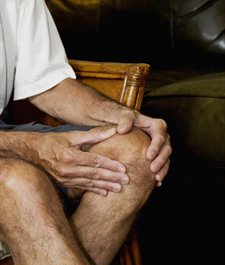Early treatment of bone breakdown inhibits the onset of pain and joint damage in osteoarthritis
Sagar DR, Ashraf S, Xu L, Burston JJ, Menhinick MR, Poulter CL, Bennett AJ, Walsh DA, Chapman V. Osteoprotegerin reduces the development of pain behaviour and joint pathology in a model of osteoarthritis. Ann Rheum Dis. 2013 Jun 7. [Epub ahead of print]
Key findings and importance of study
It is well known that osteoarthritis causes pain, and pain can be one of the most debilitating symptoms for many people. However, it is not understood why osteoarthritis is painful. Cells called osteoclasts break down bone in the joint during the early stages of osteoarthritis. In this paper we have shown that inhibiting the activity of these osteoclasts in early osteoarthritis decreases pain and joint damage later in the disease. These findings show us that bone is important in the generation of arthritis pain, and help us to build a better understanding of the reasons why osteoarthritis is painful. This new knowledge is helping us to develop new drugs that in the future will better treat and prevent pain from osteoarthritis.
Background
The knee joint is largely comprised of bone, which is constantly being broken down by osteoclasts and reformed by bone-building cells known as osteoblasts.
Under normal circumstances, bone breakdown occurs at the same rate that it is replaced. However, in some disease states, the bone may be broken down more quickly than it is reformed, and at late stages of osteoarthritis there is excessive bone formation resulting in bony growths on the joint. OPG-Fc, a man-made protein which mimics a naturally occurring substance produced in the body, is known to inhibit the activity of osteoclasts and thus prevent bone breakdown.
People with osteoarthritis seek treatment at varying stages of their disease, and treatments that work in early osteoarthritis may be different from those that work in late disease. The effectiveness of promising new drugs such as OPG-Fc can be investigated using laboratory experiments.
These experiments allow studies at different stages of osteoarthritis to determine at what stage of osteoarthritis treatments are most effective. This type of information is important for the future use of these promising drugs, but difficult to obtain from studies of people with osteoarthritis. Rats with knee osteoarthritis show changes in their joint and tend to put less weight through their arthritic knee, in a similar way as do people with osteoarthritis. These rats can therefore be treated with new drugs aiming to reduce arthritis pain, providing us with the information that is required before those drugs can be tried by people.

Aim of the study
We wanted to know whether OPG-Fc was able to reduce pain and joint damage in rats with osteoarthritis.
How the study was carried out
Rats with knee osteoarthritis were treated with OPG-Fc from the start of their arthritis and the effects on pain and joint damage were evaluated. We also looked at how effective OPG-Fc was at altering pain and joint damage once the arthritis was well established.
What the study found
We found that early treatment with OPG-Fc was able to decrease the osteoclast activity, and inhibit the onset of pain and joint damage in rats that were developing osteoarthritis. Treatment with OPG-Fc in established arthritis was also able to reduce pain, but did not alter the extent of joint damage.
Significance of the study to arthritis pain research
An integral part of the Pain Centre’s work is to investigate the underlying mechanisms of arthritis and to identify new drugs for treating chronic arthritis pain. This study indicates that osteoclasts play a role in the pain caused by osteoarthritis, and inhibiting these cells early in the disease may have beneficial effects, both reducing pain and slowing joint damage. These findings may point to a beneficial effect of treatments that target the bone at early stages of osteoarthritis, and offer hope that in the future we may be able to develop treatments that prevent severe pain developing by treating osteoarthritis when symptoms first appear.